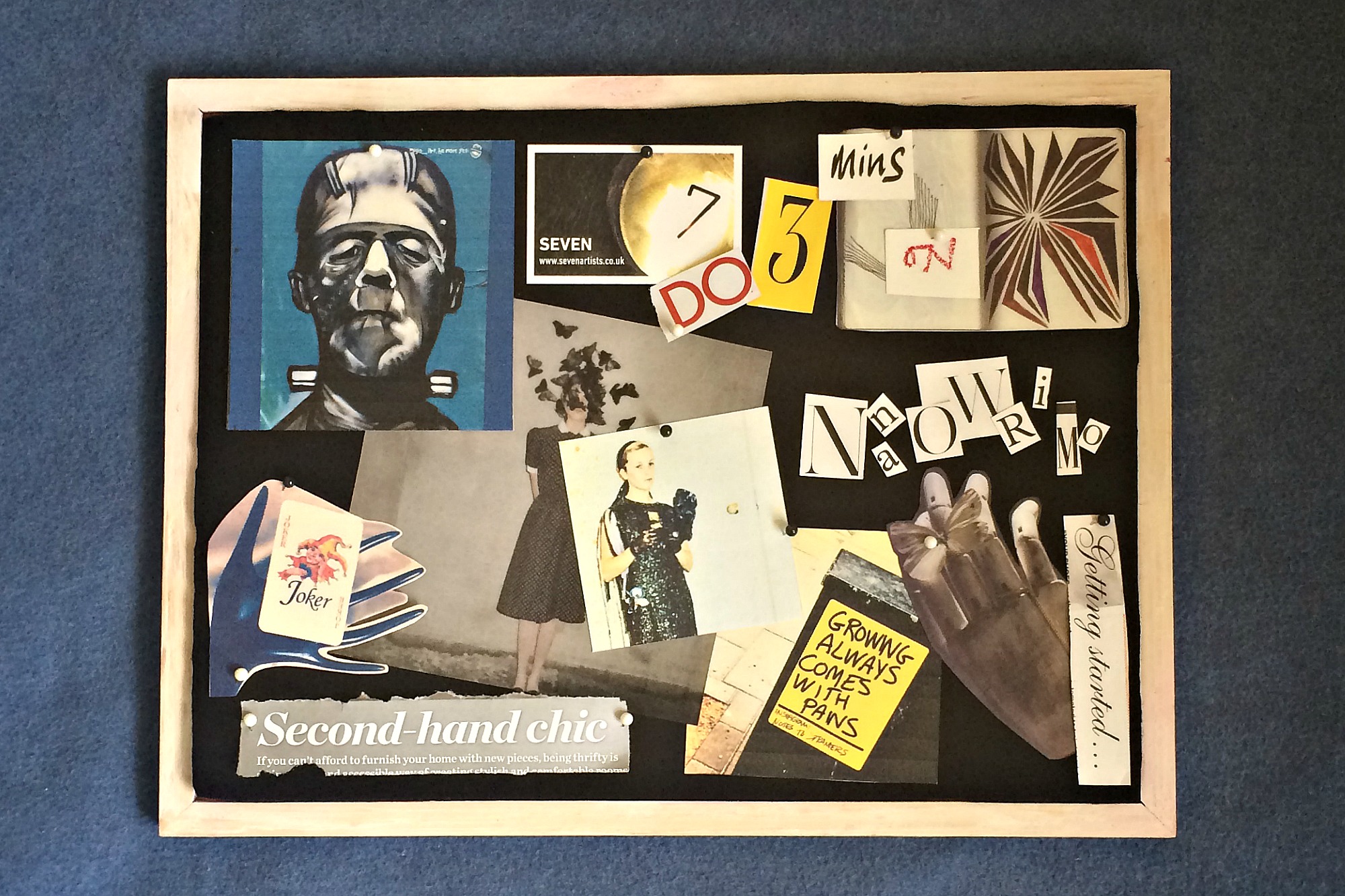Remember, remember. This November things got darker. And deeper, as I began to ponder my grandmother’s love affair with horror legend Boris Karloff. I tried to NaNoWriMo it, and spent a cosy afternoon with my shadow...
“Why don’t you cover a big cork bulletin board in bright pink felt, banded with bamboo, and pin with coloured thumb-tacks all your various enthusiasms as your life varies from week to week?”
My Grandma Loved Boris Karloff
My mum’s mum is a woman of mystery. How she went from being a petite, chignoned blonde to a Les Dawson-in-a-dress-look-alike is not so much mysterious, as evidence of what life and 12 (actually 13-but-that’s-another-story) kids can do to you. Beyond this, however, we know very little.
One of the few things we do know for sure is - she loved Boris Karloff.
She would have been 10 when his seminal film Frankenstein came out in 1931. And by the end of the 30s she was an usherette. So, I asked myself a question: could the films of Boris Karloff help me to know and understand my grandma a little better?
Watch this space…
Why Kids Should Watch More Horror
Imagining my 10 year old grandmother going to see Frankenstein at the pictures got me wondering: is horror bad for kids? Or did they know stuff we didn’t way back? Because in the early days of cinema there weren’t really kid-specific films.
Cue Spirit of the Beehive where a young girl gets fixated on Boris Karloff’s creature when a travelling cinema showing Frankenstein comes to town.
According to Greg Ruth - NY Times bestselling author and comic artist - by over-sanitising what children watch:
“We deny to our kids the full measure of what we experience and suffer as adults, but they aren’t idiots and know something’s going on, and what we’re really doing by accident is robbing them of the trust that they can survive.”
Ruth says, as a kid, he wound up finding:
“[A] great sense of trust in scary movies I never got from my parents, who tried to comfort me by telling me ghosts weren’t real. Horror told me they were, but it also taught me how to face them.”
Me & My Shadow - an afternoon with Hanna Ehlers-Bond
Psychiatrist and psychoanalyst Carl Jung had a theory: we all have a shadow self.
Jungian analyst, Aniela Jaffe described the shadow as the:
“[S]um of all personal and collective psychic elements which, because of their incompatibility with the chosen conscious attitude, are denied expression in life.”
And Jung said:
“One does not become enlightened by imagining figures of light, but by making the darkness conscious.”
And, so that’s what we were doing one Saturday afternoon shrouded in candlelit darkness...
NaNoWriMo November
November is dedicated to that bucket list of a To Do - write a novel. AKA National Novel Writing Month (or NaNoWriMo). You can join a global and local community of writers all aiming to get 50,000 words written in 30 days.
Sounds crazy, but it’s doable. Think: 1,666 words a day and it sounds better, right?
Inevitably, stuff happens and you’ll get behind. But NaNoWriMo has solutions - one of which is Twitter Sprints. Basically live prompts of varying lengths where you write as much as you can for 20 minutes, 10 or 5 even.
NaNoWriMo gets you started and over your self doubt. Like Bird by Bird author Anne Lamott wrote:
“Perfectionism is the voice of the oppressor, the enemy of the people. It will keep you cramped and insane your whole life, and it is the main obstacle between you and a shitty first draft.”
Because your first draft won’t be Dostoyevsky or even Dr Seuss, it will be shitty. I wouldn’t even call mine a first draft, but more a massive, grammar-absent, spelling error-infused stream of consciousness. Embrace it, and maybe there’ll be the odd gem glinting amongst the rubble...
SEVEN Do Twenty One’s Pecha Kucha Night - #PK125
Pecha Kucha anyone? Turns out it’s a time-limited way of presenting initially imposed on talkative architects.
For me and the SEVEN collective it meant 3 minutes for two of us to present something on our sketchbooking project. Three minutes meant forty (odd) Southend-based creatives could get to speak about their stuff in one single evening.
Which meant we heard about everything from Wild Essex to contemplations on ageing and death, learning to tap dance, and, of course, TV censorship across the globe - which wound up in a Cinema Paradiso-esque montage, but instead of kissing there was a lot of swearing and a guy having his face minced up by a handheld power tool...
Notes to Strangers - affirmation, schmaffirmation
I discovered the artistic phenomenon that is Notes to Strangers (NTS) earlier this year. And ever since I’ve been thrilled to stumble upon NTS posters across London. Then this month Andy Leak (Mr NTS himself) displayed a selection of his posters at the newly opened Browns East.
A rainbow array of posters were suspended like flags across the entrance to the showroom: words of advice, inspiration and sometimes just plain silliness upon them.
One of my faves so far:
“Everyone is winging it.”
Secondhand Style First
TRAID’s #Secondhandfirst Week is dedicated to celebrating the power of reusing the clothes and other resources we already have.
According to WRAP - a body dedicated to delivering “practical solutions to improve resource efficiency”:
Clothing has the fourth largest environmental impact after housing, transport and food.
TRAID goes onto say:
Sourcing more of our clothes (and other goods) second-hand is a practical way of immediately adopting a more sustainable way of living.
Plus, personally I still get a thrill from discovering a charity shop gem.
